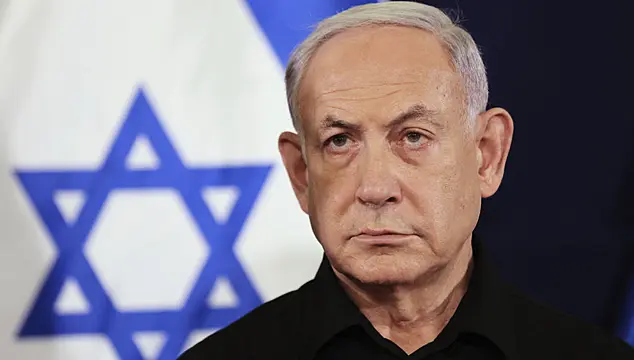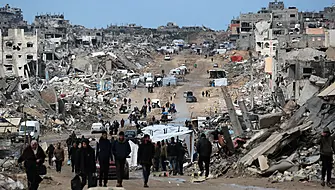Israel’s prime minister has called a permanent ceasefire in Gaza a “non-starter” until long-standing conditions for ending the war are met, appearing to undermine a proposal that US president Joe Biden had announced as an Israeli one.
The statement from prime minister Benjamin Netanyahu’s office came a day after Mr Biden outlined the plan, and as families of Israeli hostages held by Hamas called for all parties to immediately accept the proposal.
“Israel’s conditions for ending the war have not changed: the destruction of Hamas’ military and governing capabilities, the freeing of all hostages and ensuring that Gaza no longer poses a threat to Israel,” the statement said.
“Under the proposal, Israel will continue to insist these conditions are met before a permanent ceasefire is put in place.”
Israel has now offered a roadmap to an enduring ceasefire – and the release of all the hostages.
Yesterday, this proposal was transmitted by Qatar to Hamas.
Today, I want to lay out its terms for the world. pic.twitter.com/0cdypBP9wb— President Biden (@POTUS) May 31, 2024
On Friday, Mr Biden asserted that the militant group is “no longer capable” of carrying out a large-scale attack on Israel like the one in October that started the war.
He urged Israel and Hamas to reach an agreement to release about 100 remaining hostages, along with the bodies of around 30 more, for an extended ceasefire.
Talks stopped last month after a push by the US and other mediators to secure a deal in the hope of averting a full-scale Israeli invasion of Gaza’s southern city of Rafah. Israel says the Rafah operation is key to uprooting Hamas fighters responsible for the October 7th attack.
Israel has confirmed its troops are operating in central parts of the city. The ground assault has led around one million Palestinians to leave Rafah and thrown humanitarian operations into turmoil. The World Food Programme has called the living conditions “horrific and apocalyptic” as hunger grows.
This is a decisive moment.
Now is the time to raise your voices and demand that Hamas comes to the table, agrees to this deal, and ends this war that they began. pic.twitter.com/ugWZYmaWuJ— President Biden (@POTUS) May 31, 2024
Families of hostages said that time was running out.
“This might be the last chance to save lives,” Gili Roman told The Associated Press.
His sister, Yarden Roman-Gat, was freed during a week-long ceasefire in November but sister-in-law Carmel is still held. “Our leadership must not disappoint us. But mostly, all eyes should be on Hamas,” Mr Roman said.
Families described an aggressive meeting on Thursday with Israel’s national security adviser, Tzachi Hanegbi, who told them the government was not ready to sign a deal to bring all hostages home and there was no plan B.
Mr Hanegbi said this week he expects the war to continue another seven months to destroy the military and governing capabilities of Hamas and the smaller Islamic Jihad militant group.
Mr Netanyahu has promised “total victory” that would remove Hamas from power, dismantle its military structure and return the hostages. On Saturday, his government said its conditions for ending the war had not changed.
Our proposal to end the war in Gaza begins with a complete ceasefire, withdrawal of Israeli forces from all populated areas in Gaza, the release of hostages and hostage remains, the ability for Palestinians to return to Gaza, and a surge of humanitarian assistance.
— President Biden (@POTUS) May 31, 2024
Many hostages’ families accuse the government of a lack of will to secure a deal.
“We know that the government of Israel has done an awful lot to delay reaching a deal, and that has cost the lives of many people who survived in captivity for weeks and weeks and months and months,” Sharone Lifschitz said. Her mother, Yocheved, was freed in November but her father, Oded, is still held.
The first phase of the deal proposed by Mr Biden would last for six weeks and include a “full and complete ceasefire”, a withdrawal of Israeli forces from all densely populated areas of Gaza and the release of a number of hostages, including women, older people and the wounded, in exchange for the release of hundreds of Palestinian prisoners.
The second phase would include the release of all remaining living hostages, including male soldiers, and the withdrawal of Israeli forces from Gaza. The third phase calls for the start of a major reconstruction of Gaza, which faces decades of rebuilding from the war’s devastation.
Mr Biden acknowledged that keeping the proposal on track would be difficult, with a number of “details to negotiate” to move from the first phase to the second. Mr Biden said if Hamas fails to fulfil its commitment under the deal, Israel can resume military operations.
Hamas said on Friday it viewed the proposal “positively” and called on Israel to declare an explicit commitment to an agreement that includes a permanent ceasefire, a complete withdrawal of Israeli troops from Gaza, a prisoner exchange and other conditions.
In Deir al-Balah, where many Palestinians have fled following Israel’s ground assault on Rafah, there was some hope.
“This proposal came late, but better late than never,” said Akram Abu Al-Hasan. “Therefore, we hope from God, the American administration, and the European community in general to continue to put pressure on Israel for a ceasefire.”
This is a decisive moment:
Israel has made their proposal. Hamas says it wants a ceasefire. This deal is an opportunity to prove they mean it.
Hamas needs to take the deal. pic.twitter.com/UcXOP3iZG6— President Biden (@POTUS) May 31, 2024
The main difference from previous proposals is the readiness to stop the war for an undefined period, according to analysts. It leaves Israel the option to renew the war and diminish Hamas’s ability to govern, but over time, said Michael Milshtein, head of the Palestinian Studies Forum in Dayan Center at Tel Aviv University.
“It was a very good speech … it seems that Biden is trying to force it on the Israeli government. He was clearly speaking directly to the Israeli people,” said Gershon Baskin, director for the Middle East at the International Communities Organisation.
Also on Saturday, Egypt’s state-run Al-Qahera News said officials from Egypt, the United States and Israel would meet in Cairo over the weekend for talks about the Rafah crossing, which has been closed since Israel took over the Palestinian side in May.
The crossing is a main way for aid to enter Gaza. Egypt has refused to open its side, fearing the Israeli control will remain permanent. Egypt wants Palestinians to be in charge again. The White House has been pressing Egypt to resume the flow of trucks.
Hamas’ attack on October 7th killed around 1,200 people — mostly civilians — and abducted about 250. More than 36,370 Palestinians have been killed in Gaza by Israel’s campaign of bombardment and offensives, according to Gaza’s Health Ministry.







